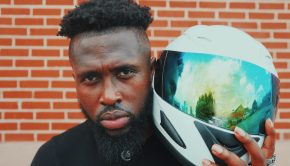Part 1 of My Conversation with Danny Schneider of Netflix’s “The Pharmacist!”
Heroes don’t always wear capes and Danny Schneider is living proof of that.
Sometimes there are no boundaries for the risks and sacrifices we are willing to subject ourselves to for the sake of our children. We face our deepest fears, overcome the toughest obstacles and sacrifice it all for their well-being. Louisiana native, Danny Schneider took this mentality to new heights when his 22-year old son, Danny Jr. was gunned down and murdered during a drug deal in 1999. Schneider took it upon himself to solve the murder and provide justice for his son. That mission took him to The Lower 9th Ward. An area most wouldn’t dare to investigate or question its patrons regarding a murder. With little to no cooperation, Mr. Schneider’s persistence paid off. Not only in solving his sons murder, but he was also responsible for shutting down a powerful doctor in New Orleans who over prescribed opioids to underserving patients.
Part I of my two-part conversation with, Mr. Schneider gives an in-depth look at the making of the Netflix special, “The Pharmacist,” details the reason he started recording all conversations and much more!
What a courageous effort you put forth and you have accomplished some amazing things in St. Bernard Parish as well as the state of Louisiana. It was great to see it highlighted. Did you ever imagine it would become this?
Danny Schneider: I used to have a dream that I could maybe develop something like this, but I really began to think that, it was a pipe dream and I was shooting way too high. So, even when this thing broke, I expected it to do well, but it exceeded my wildest expectations. At one time I thought that some kind of way, I could breakthrough and help motivate and maybe lead beyond saving our parish. I could maybe lead the state or maybe lead the country. Or be a spokesperson and it looks like that is becoming a reality.
I love that you took a tragedy and turned it into a teachable moment of perseverance, passion, understanding and forgiving. And none of those words I just used to describe you are easy to do or be given your situation. We could all learn something from you. We often take situations like yours and want to exact revenge and you showed us a different way.
Danny Schneider: It was very important for me to get my message out in the manner that I did. There are two major events in that documentary, maybe three, the fact that I found my son’s killer, the fact that I put one of the major doctors out of business… I actually put a couple of other doctors out of business, they are just lesser known. And then I went on to try and do a little something… what isn’t spoken on is, for years, I spoke at schools, I wrote newspaper articles, I talked to Congressman, I talked to Senators. For years I trudged along and basically, I hate to say it, almost nobody paid attention to me. I had some wisdom. I might have been ahead of my time. Maybe they couldn’t relate to what I was saying. Or maybe they thought I was a grieving father that was just overcompensating and didn’t hear me, but now, I have them calling me and they want to hear what I have to say. Yes, there is a certain amount of pride, vindication, authentication or whatever you want to call it. What I have thought for years, people really wanna hear.
You went to areas that I would be hesitant to visit, especially in search of the type of information you were looking for. I’m sure you were called crazy, but did some people learn of what you were doing and say, “You’re on your own on this one?”
Danny Schneider: Actually, there were point and times where I was on my own. I did occasionally get some help. But I kind of knew I was on my own. I couldn’t always ask people to do what I was doing. I will say this, there were definitely dangers and I’m sure there were people that thought about killing me. In fact, I have heard some of that now after years went by. They kind of had a hit on me. I wasn’t crazy to the point where I merely did stupid things. Although, you could just consider going there as being stupid. I would go in during the day. At times, I would use different vehicles so that they couldn’t recognize my vehicle. And I would usually go in for a short period of time. I would go in and work a half an hour or 45 minutes and I’d leave. That way they didn’t necessarily get a chance to pin me down. I was kind of wise like a fox a little bit. I still could’ve gotten clipped don’t get me wrong. And a couple of times when I spent more time, I had people with me, so to speak, riding shotgun.
Sometimes the mission eliminates fear and you can only envision the mission. Were you ever afraid or nervous?
Danny Schneider: Absolutely, I was afraid a couple of times. There were a couple of what I think might have been close calls. One time when I was up there, and I was actually up there with my wife. Every now and then my wife came with me. And when she came with me, we usually would go on a Sunday like during the day when we thought it was probably safest. She didn’t go up there much with me, but she did go up there a couple of times. I remember one time, we were in one of the hood neighborhoods, and a car stopped in front of me and he started burning his tires. I was behind him and then they had a car pulled up right behind me. There wasn’t a way to get out, and I had this sense like, Maybe this is it. Maybe they recognize who I am.” And maybe they actually did. It might have been an intimidation thing, but they didn’t really approach us. Eventually, the car took off and I was able to get out. Me and my wife were scared shitless.
I don’t blame you.
Danny Schneider: Let me tell you though, Percy, and this is one thing that I tell people, I was so kind of known in a sense, if they would have killed me, this wouldn’t have been a normal killing. This thing would have been investigated. People would have paid a price for this. There would have been some serious police work; both from St. Bernard and New Orleans. I’m not saying that protected me, but maybe that helped. They might have been saying, “You know, we want to take this guy out, but we’re going to get a lot of heat if we do.”
I have been interviewing people for 19-years. And you taught me something that I think I perhaps took for granted or just kind of always moved to the next interview. Because of you, I save all recordings now. You recorded everything and you saved it all.
Danny Schneider: (Laughing). A lot of people have asked me the question of why I recorded everything. I hate to cop out on you. I’m going to give you an answer, but I’m not even totally sure I know why. I will tell you how it started. I really didn’t plan on recording. I really didn’t think, I would have to solve the case. At some point, I really thought the police were really going to do this. So, I didn’t record anything. What happened was, we had a run-in with the police. A big run-in. I was given permission to post the reward, the sergeant underneath really didn’t want the reward put up. Okay. So, the lieutenant overrode him. He blamed me for pressuring the lieutenant. Which, maybe I did. I don’t know. Anyways, we go to New Orleans for a news conference. I get up there and my wife get up there and we both cry, and we announce a $10,000 reward, and I go home. Now, I didn’t know this sergeant. I didn’t know this lower level guy. I didn’t even know he exist. I was dealing with his boss not with him. So, I go home and
I’m sitting down, and I watch the news and I’m feeling pretty good about the day. “Hey look, maybe we did something today that might lead to something.” Well I get a call at maybe 10:30 at night, and this guy jumps all over my ass. He criticizes everything that I do. He tells me that if I keep getting involved in the case, he’s going to throw my son’s case away. He insulted me, he insulted my son and my family. He ripped me a new butthole, okay. And he told me, “If you go above or below me, I will throw your case away.” I was so shocked. I had worries, but I thought, things are going okay with the police. And then all of a sudden, it’s like, “My God, how am I gonna deal with somebody like this?” I immediately took out a notepad and I still have the notes. In fact, the documentary people had those as well. I didn’t have a recorder. I wasn’t recording. I wrote notes, as much as I could remember and of course I couldn’t remember it all. I had it a little out of context.
It’s difficult to keep notes on occurring events for sure.
Danny Schneider: Yes! I was frustrated. And I said, “They are not going to beat me again. They are not going to beat my ass again.” From that minute on I went out and bought all kinds of recording devices. And that started the recording process. It kind of morphed into… I started using it as a… I had trouble relating to people, even to my wife. Nobody wanted me up there. They thought I should let the police handle it. So, I had trouble relating to people. It was hard to talk to people, so I would go in my room and I would start recording myself. It was like, I can talk to somebody and it felt like I was talking to somebody when I was recording. That also morphed into the investigative part too. There were times an event would happen on a day and so much was going on in my mind. I didn’t trust myself, so I would say something about what happened today. Just in case 3-days from now, I could go back and listen to myself and pick up on it.
Let me tell you, there’s a third element here, some people say this, I don’t really think it’s true, but maybe subconsciously it was. At some point in time, I felt like it was a real surreal situation. I felt like I was living in a dream or a movie. So, the taping was a way to record the movie, so that maybe one day I would wake up and find out that there really was no tape. It’s strange, but let’s be honest, you’re half crazy, okay. You really are. Maybe crazy ain’t the word, but you’re riding on the edge. I had to do whatever I can do to help me survive. That’s how that evolved, and I don’t even know if that’s the whole answer but that’s as close as I can get.
That’s a great explanation and I completely get it. I won’t be deleting any of my interviews moving forward.
Danny Schneider: Yes. I kept recordings and journals. I write really bad and sometimes with my journals, I couldn’t read my own writing (laughing). I found it easier to tape it. I will say this, I might have recorded hundreds of hours of tape. But some of those tapes, I have never actually listened to.
Really?
Danny Schneider: That’s right! I was so busy always moving forward, I didn’t always go back to it if I felt I didn’t need to. We caught a lot of our family life in there. Because it was an inline recorder. That was one of my ways of doing it. Which really meant… with the old phone systems, not cell phones. Every call that came into the house, automatically started recording. So, if my wife got a call from her girlfriend, “Hey look, let’s go have lunch,” we recorded that. So, they had a real job fishing through this thing. I appeared really organized, but I sorta ain’t, okay. It was on there and I kept it, but they had to fish for it. I did in some cases go back and listen to it and label some of them. But I maybe only did that with 50% of them.
Wow! So, this wasn’t an easy documentary to piece together. Someone had to sort through the home stuff and the case related stuff.
Danny Schneider: Oh no! They put a lot of work into it. They took all my material and apparently had people listen to the whole thing and picked out the important things.
You are a straight up dude because there were obviously no secrets in that house to just hand all those recordings over like that.
Danny Schneider: Did you hear the part; this is kind of comical. There is always a little bit of fun or humor in a sense. My wife one time… my base phone with the recorder was downstairs near my kitchen. The recorder would pick up right there and my wife was in the kitchen if I have this remembered correctly. Maybe she was talking to somebody, and I had somebody on the phone, and I was talking loud and she was always aggravated with me. She was aggravated with me talking loud and she said, “If you don’t shut up, I’m going to punch you in the mouth.” All of her girlfriends called her up. People that really know us and whatnot and they said, “Get him, Annie!” I find it amusing now. I guess back then it wasn’t.
Be sure to check back for Part II with, Mr. Danny Schneider
Tweet





























